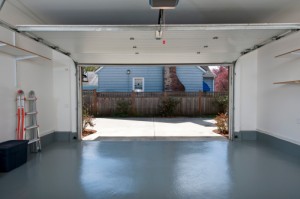Learn why cooling your garage is a smart investment and how to select an AC unit for the garage.

Why Cool Your Garage
Without air conditioning, your garage can quickly become intolerably hot, especially in the summer. If you have an attached garage, the temperature inside the garage will affect temperatures in your home as hot air seeps in through shared walls and doors. If you have a living space above the garage, the problem will be particularly noticeable as hot air rises through the garage ceiling into this room. Your central AC will have to work harder in order to keep your home cool. By cooling your garage, you can take the burden off your central AC and hopefully save money on your utility bills while also increasing your comfort.
Best Types of Air Conditioning for the Garage
The best option for a garage air conditioner would be a window unit or a ductless air conditioner. Either of these options allows you to cool your garage without connecting to your ductwork. This is very important because it helps prevent the possibility of odors, allergens, or even dangerous gases like carbon monoxide from sneaking into your home from the garage. Another benefit of using an independent cooling unit for your garage is that you can set the garage to a different temperature than the rest of the home to save a bit of money on your utility bills.
Improve the Effectiveness of Your Garage AC
If you want to cool your garage without increasing your overall cooling costs too much, it is essential to make sure of two things. First, be sure you choose the right size of air conditioner for your garage. A unit that is too small will run constantly without achieving he desired temperature, while a unit that is too large may cycle on and off too frequently which wastes energy. Secondly, be sure that the garage is properly sealed and insulated. Installing insulated garage doors, adding insulation to walls (especially those with strong sun exposure), and placing reflective coverings on the windows can help prevent cooled air from escaping and also control heat solar gain so your air conditioner doesn’t have to work overtime to cool your garage.






